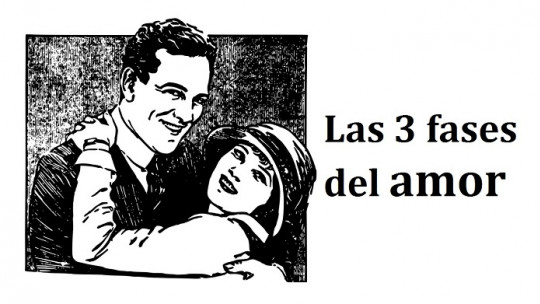The couple is evolutionary, because throughout life a process occurs in which three fundamental stages can be identified : the first is confluence, the second is called divergence-convergence, and the third stage is coexistence.
The passage from one stage to the other does not occur without crisis, which is embedded in the vital process. Let’s see it in this article.
The main stages of the couple
Here you will find a brief summary of the states that relationships can go through if they are given enough time.
1. Confluence Stage (or falling in love)
It is called this way referring to the fact that It is like the confluence of two rivers that join together to form one The greatest confluent experience of the human being is the experience of love, since in it the sense of individuality is lost.
In this first stage there is an emergence of sentimentality and destruction of “individualizing” limits between experience and the real, with a marked emphasis on the aesthetic and the subjective. Confluence is the compensatory response to the existential loneliness left by the breakup with the father and mother, a typically adolescent phenomenon.
Characteristics:
Problems of this phase:
When does this first stage end?
This confluence stage It tends to end when the strongest gets bored with dominating, and the weakest resents it and accumulates negative reactions of repulsion to dominion. Thus, they enter into crisis and the situation of dependence and dominance is broken.
Crisis factors
Let’s look at the main aspects that make the relationship go into crisis in this phase.
First of all, by awareness of one’s own reality The awareness of one’s own limitations changes the image one had of oneself, feeling incapable and powerless. This awareness of one’s own limitation or weakness puts the confluent relationship in crisis and frequently appears the tendency to find a “lover” with whom the confluence stage would restart, with the aggravating factor that, in this relationship, the confluent stage tends to be perpetuated by the lack of stable legal bond.
Secondly, for awareness of the limitations of the other : When the other’s limitations, reactions, impulses or voids clearly appear, awareness of the “change” in the other is created.
Thirdly, for awareness of the demands of the world and the context The economic requirements of supporting the home, the emotional, professional, time demands, children, education, health, etc., wake up the confluent couple and put them in a relational crisis, blaming each other: “It’s just that you waste …”, “you just don’t have time anymore…”.
It can also occur by the awareness of frustrated aspirations The bitter awareness of aspirations that have not been realized now become the awareness of having believed in utopias.
Finally, for sexual frustrations : Thanks to these frustrations, rigidity, insensitivity, distance is experienced, so that some refuse to have relations with the other, who in turn feels disillusioned, disappointed. This gives the couple a mutual feeling of incomprehension and rejection, “he no longer accepts me like before”, “we are different”, and now they are incompatible in tastes, hobbies, and interests, which leads to perceiving themselves as deceived and disillusioned.
Alternatives:
It is important to recognize that The marital relationship and the couple’s communication is a process It is not that they are different now, it is not that they have deceived themselves, but that the true reality of what they have always been has already been discovered. The end of the confluence is neither good nor bad, it is simply the completion of one stage of the process to follow another.
2. Divergence Stage – Convergence
In the case of divergence, at this stage each one begins to individualize to each assume their own identity. They begin to reject dependency and make demands for recognition of their own rights. This is where conflict is generally created and it is up to the couple to learn to use emotional communication and develop self-support so that the conflict is faced with maturity and from love.
At this stage there are complaints, more tenderness, more time, more equality is demanded from someone. The other, on his part, expresses his overwhelm in the face of these demands, highlights the counterpart’s carelessness and the way in which he is absorbed by the demanding attitude of his partner.
This also is aggravated by the polarization of functions when children appear, one in charge of upbringing and education, and the other in charge of the economic part to provide stability. In these polarized roles, the party that is in charge of the affection with the children compensates for frustrations in other areas, while the one in charge of the economic burden does not have this escape and that is when infidelity tends to appear, mainly to escape. of an emotional crisis.

Those who are in charge of the emotional and educational role with their children generally limit their social contact and by contacting them with an attitude of loneliness they become an even more demanding and absorbing person. In turn, the person responsible for the economic part feels disappointed by the demand, since all his effort and work has been perceived as a sign of his love to provide security and survival.
The one who plays the economic role feels important and valuable; however, the polarized counterpart develops economic dependence who feels that it coerces his freedom.
This situation entails:
Sexual conflict and differences regarding ethical values appear. Infidelity or aggressiveness appears, financial bankruptcy or problems of alcoholism, addiction or overwork among others are exacerbated, leading to a breakup of the couple or the awareness of the breakdown of the marital relationship, to seek reconciliation or professional help.
When convergence occurs is the phase in which the couple, through full contact and emotional communication, begins to find points of convergence to overcome their conflicts.
This is the stage in which the couple acquires the skills to:
3. Coexistence Stage
It is the stage in which the couple deepens their love, recovers lost trust they reconquer themselves emotionally to rebuild the emotional bond and prepare to, if there are any, evolve with their children.
There are no shortage of problems, but the couple is already capable of facing them and assimilating them in a climate of acceptance, understanding and authenticity. The dialogue becomes deeper, more intimate; Confidence fully returns and fears of expressing one’s opinions become common.
In-depth knowledge of the other spouse makes you assume a more flexible and less rigid attitude towards him.
All this creates a deep adaptation towards each other, to change what can be changed, and accept those that cannot be changed with feelings of respect for the other
There will be no shortage of conflicts, reasons for discussion, and differences will remain, but we live in a climate that is neither recriminatory nor blaming.
Spouses who have already reached the dispersion stage feel alone again, but with joy, they plan their coexistence again in the solitude of two.
The couple is a life process that is born, grows, develops and matures, becoming a “we” of increasing depth and intimacy. Only in this way can we reach the stability of the couple and the irrevocability of love, without fear or fear of the future, for the good and happiness of both.









